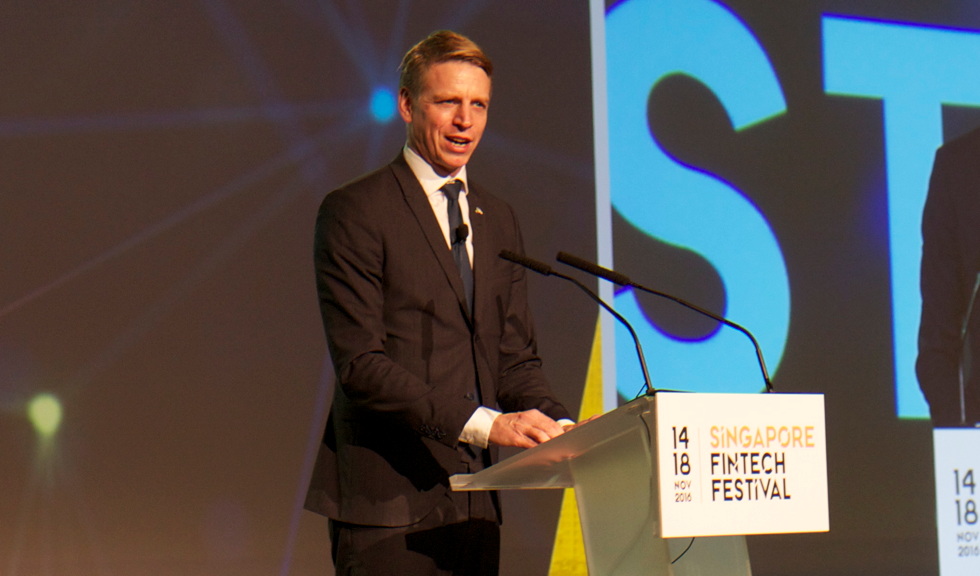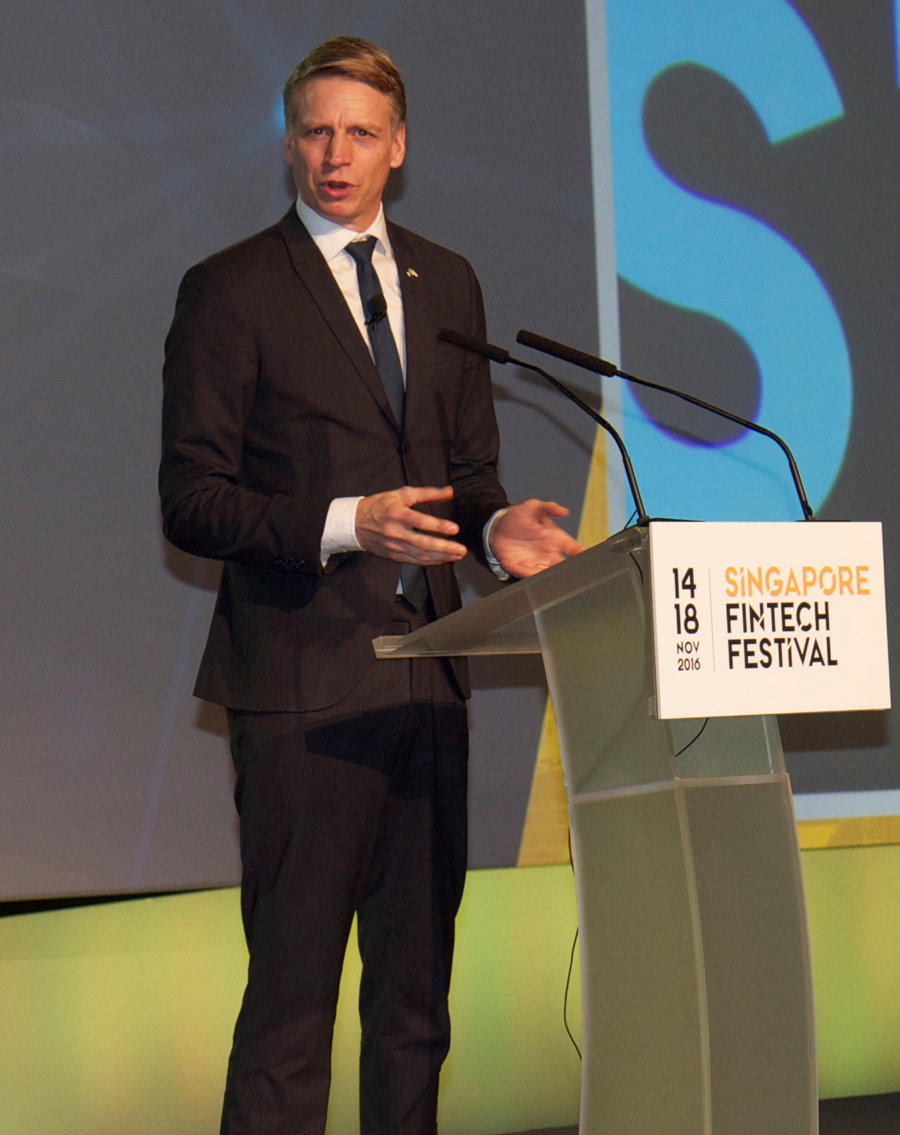FinTech, or financial technology, was in focus for a minister-led Swedish delegation to Singapore in connection to the inaugural FinTech Festival 2016.

The delegation that included 12 Swedish FinTech companies and Stockholm School of Economics representatives came to Singapore to hold meetings with industry (including Venture Capital firms and Investors) and government representatives, with the aim to provide the Swedish companies with knowledge of the market and the opportunity to build networks for the promotion of future expansion.
The basis for this delegation is a great interest in Sweden’s experience within digital payment systems, since the country is at the forefront of development, and a leader in digitalization.
On the Singapore side it is still earlier days and the organiser of the festival, Monetary Authority of Singapore (MAS), has several new initiatives to drive FinTech.
Looking a bit into the background to this key sector, the circumstance around FinTech is that this is transforming financial services, in a way not seen before in the form of: 1) Unprecedented mobility: the smartphone is becoming our bank. People can consume financial services on the go. 2) Unprecedented connectivity. The Internet has compressed time and space. Interaction is real-time and unconstrained by physical boundaries. 3) Unprecedented computing power; thanks to our hand devices packing more data and more processing power than super computers just a couple of decades ago.
Digital payments are becoming more widespread, propelled by advances in near-field communications, identity authentication, digital IDs, and biometrics. Blockchains or distributed ledgers are being tested for a wide variety of financial operations, to make them faster, more robust and more efficient.
Furthermore, there is the so called Big Data, which is about aggregating and analysing large data sets to gain richer insights into customer behaviour and needs, detect fraud or anomalies in financial transactions etc.
Be it countries, businesses, or people, those who are alert to technology trends, understand their implications, and harness their potential will gain a competitive edge, states the MAS. Singapore, like Sweden wants to belong to those countries that will benefit from FinTech.
Singapore makes the insightful conclusion: “Many of these technologies are disruptive to existing jobs and existing business models. But if we do not disrupt ourselves – in a manner we choose – somebody else will – in a manner we will not like.”
In connecting to FinTech one comes across concepts and descriptions that may seem a bit abstract to many of us, such as ‘regulatory sandbox’ or “flowers of innovation to bloom”.
MAS laid out a vision for a Smart Financial Centre, where innovation is pervasive and technology is used widely. MAS has been working closely with the financial industry, FinTech start-ups, the institutes of higher learning and other stakeholders towards this shared vision.
Among the initiatives is a so called ‘Regulatory Sandbox’ to test innovative ideas, launched in June 2016. This sandbox serves two purposes: Allowing experiments to take place, even where it is not possible at the outset to anticipate every risk or meet every regulatory requirement; and providing an environment where if an experiment fails, it fails safely and cheaply within controlled boundaries, without widespread adverse consequences.
The second key thrust of Singapore’s FinTech agenda is to facilitate the infrastructure necessary for an innovation ecosystem and the adoption of new technologies (which correctly includes building the ecosystem needed, were people can connect and collaborate, and ideas can flow and multiply. That is where MAS is speaking of “wanting a hundred flowers of innovation to bloom but also to ensure they make a garden”, in reference to this infrastructure.

As part of the Singapore Fintech Festival the RegTech Forum took place on 18 November with Sweden’s Minister for Financial Markets and Consumer Affairs, Mr Per Bolund as the day’s first keynote speaker. The minister shared insights from the Swedish FinTech experience, highlighting three principles of particular importance to reach this vision of a new efficient financial system. He also touched upon opportunities and challenges that we face in the near future for FinTech and RegTech.
He began by pointing out that Stockholm is becoming the leading city in the Europe when it comes to FinTech development, and that he had already noted from his first to Singapore that the country share many similarities with Sweden. Both, he noted, are are quite small in a global context, and clearly also are open-minded countries, opening up for opportunities and new developments, and, very importantly, also free trade-oriented countries.
“Sweden’s economy is reliant on highly competitive manufacturing and service sectors and I can see that Singapore is following the same path. Singapore is indeed on to a thriving eco-system and is also a great gateway to Asia. Given these similarities between the two countries, I believe there is great value to share and exchange ideas and practices,” said Per Bolund.
“FinTech spreads across different sectors of the financial markets and is present in for example payments, credit provision, financial advice and insurance. This is in my view and the Swedish experience a very positive development.”
“Personally, I believe FinTech may help us to achieve fundamental changes in the way that we do finance in the future and the way the financial market works.”
“I think we will have a safer financial market, due to increased information and transparency enabled not least by technological innovations and better systems for monitoring and tracking transactions, also not least, new and efficient payments that are safe and are easy to use and are convenient for us.”
The minister went on to highlight Sweden’s attractiveness for investment, with the thriving FinTech community as a perfect example (a bit over 120 companies in Stockholm alone).
“In Stockholm, the city with the highest number of unicorn companies per capita in the whole world, we have a thriving FinTech community, very much working together in sharing information and new technologies with others. This is also attracting interest from all over the world and not least from investors trying to find suitable companies to invest in.”

Sweden is seeing rapid development when it comes to new payment systems, where the minister mentioned for instance peer-to-peer lending and crowdfunding.
“We are very strong when it comes to technological solutions but also from small new firms. The latest development moves very rapidly also when it comes to the larger actors, the big banks, who are very active in FinTech development and are investing heavily.”
“The question is how do we do we realize this fundamental change of the financial markets and make the most out of the development. In this highly competitive world I believe there are three principles of particular importance to reach this vision of a new efficient financial system; Openness, Policy and Cooperation.”
Openness, the minister said is about embracing new cultures and new ideas, and fundamental for Sweden. “And in my view all truly innovative places share the fact that they are hubs of different cultures, values and ideas. This creates an environment where new ideas and inventions are born.”
It is also about increased access to financial services for every citizen.
“Policy is about the responsibility of a government to embrace new ideas and new technologies and to create environment where these can develop into new and successful companies in the future. Policy is also about being in front and nurturing behaviour of the best interests of the citizens, the companies, but also for the environment.”
Finally, the minister believes that cooperation is crucial for success, and where he said that there are great opportunities that for instance Singapore and Sweden could cooperate.
“Digitalisation knows no borders and therefore our success is dependent on countries to deal with it both on a national but also, and not least, on a global level.”
“Sweden is a small exporting nation and being a small nation means we can never take anything for granted in this world and there is continued need to embrace and test new ideas. Often it has been fundamental not least to the success of the FinTech development in Sweden,” he continued when illustrating the developments in Sweden in connection to the three principles.
“Today, most interactions between companies or citizens of Sweden and the government is digital and most of the transactions are done electronically over the internet.”
Turning to policy, the government, he said must do “the right things”. From a Swedish perspective this means using policies to support technological developments.”
“Regarding financial technology it takes long and hard work and I would say the groundwork was laid already in the late 1990’s. In 1998 it became possible for employees to purchase a personal computer and with a tax subsidy. And as new technology required more bandwidth the Swedish government decided to support the building of a nationwide fibre network.”
Another key to the success of FinTech and other sectors that rely heavily on IT is the state’s ability to adapt and offer new ways for the citizens’ ability to communicate with the government. Secure and easy-to-use electronic identification systems have been critical to achieve this.
“The electronic identification tools are also enabling new services, such as mobile payments and remittances with a global reach.”
Digital bank transfers for wages that was introduced several decades ago paved the wave for today’s nearly cashless Swedish society. In a recent survey 15 percent answered that they had made their most recent payment in cash. In 2010 this figure was almost 40 percent.
 “Some argue that Sweden will become a cashless society within a couple of years. The policy issue here is rather access to cash. A majority of bank branches do in fact no longer keep cash on hand or take cash deposits.”
“Some argue that Sweden will become a cashless society within a couple of years. The policy issue here is rather access to cash. A majority of bank branches do in fact no longer keep cash on hand or take cash deposits.”
In this scenario Sweden is focusing its policy on how to get access to cash also onwards.
“The Swedish government tries to maintain a policy that you should have a choice yourself whether you would like to use cash or electronic payments. But no question, over time electronic payments will take over the markets in Sweden.”
The decrease in the use of cash started in the 1990s when the Swedish banks started to charge for cheques, and instead promoted the use of credit and debit cards.
Within cooperation, with new companies still emerging, the Per Bolund brought up another trend: “Both nationally and internationally banks are also starting to cooperate with start-ups, not least within the Fintech sector, in order not to lose momentum. And we know that some of the solutions and technologies in this sector is quite revolutionising.”
In order to facilitate the continued FinTech development in Sweden its government has recently taken steps to improve its public venture capital system.
“To improve success for early stage growth companies a new public fund-of-funds investment company has recently been founded, which will only invest in private venture capital funds. That means no direct investments in companies as we believe it is up to the market to decide which investments are profitable and which are not. The goal is to secure financing not only for start-ups but also for scale-ups in phases of development and segments of the market where the lack of private funds are most challenging.”
The minister also mentioned several European Union, including a new regulation on payment services, aiming to help develop an EU-wide market for electronic payments and create better conditions for secure and efficient payments. This forces current payment infrastructures to open up for competition and access, which enables more companies to join in the current payment infrastructure.
The EU is also developing a comprehensive European strategy on green finance.
Looking ahead the Swedish minister said that there is work to be done for participants to comply with regulations and for policymakers to make sure businesses can thrive notwithstanding the large amount of regulation being implemented in Europe and globally.
“Here I truly see a potential for FinTech or Regtech companies helping financial institutions to comply with regulations; Regtech development can absolutely provide compliance and make it less burdensome.“
Governments should support this development.
“However development is proceeding at a rapid pace; technical innovation goes faster than we as legislators can adjust the legal framework to fit a new era while at the same time making sure new risks are properly addressed.”
“Opportunities also come with challenges. Cyber risks as well as money laundering and terrorism financing are key risks that we need to work with. A major challenge for any country, striving to be a leading FinTech nation is to fight money laundering and terrorism financing in an effective way, without stopping the development of a digital financial infrastructure that we see can be of such benefit to all citizens of the world. Here I believe that Regtech is truly a very important part of that development.”
The balance between access and regulation for customers and companies and the risks threatening the same is a difficult but important task that all legislators are facing.
“With a large degree of openness, with the right set of policies and proper cooperation I think we are and will be well equipped to also face future challenges.”
